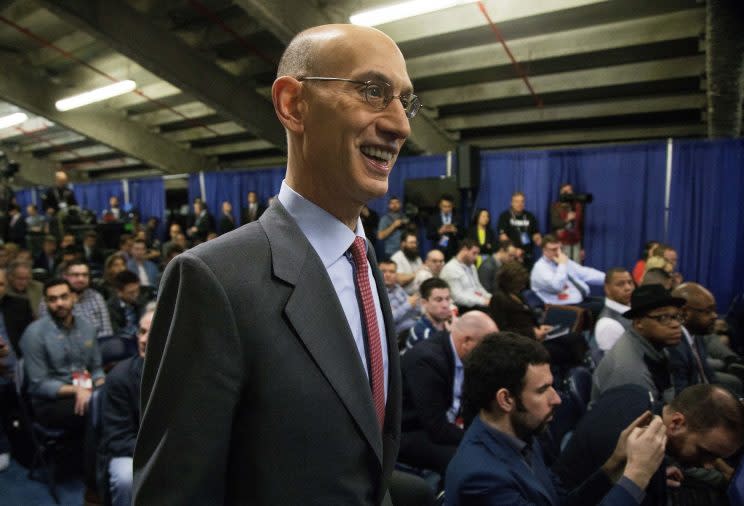Adam Silver sent NBA teams a memo about resting stars, but he's only feeding the controversy

Teams resting star players for nationally televised games has officially crossed over from mere trend to become a genuine worry for the league. Although absence-filled games such as the March 11 matchup between the San Antonio Spurs and Golden State Warriors (minus Stephen Curry, Klay Thompson, Draymond Green, and Andre Iguodala) and Saturday’s contest featuring the Los Angeles Clippers and Cleveland Cavaliers (without LeBron James, Kyrie Irving, and Kevin Love) are somewhat rare in the context of the entire schedule, contending teams sitting big names for two straight Saturday night ABC games has opened up plenty of discussions about what teams owe paying customers and media conglomerates. Is the pursuit of a championship all that matters? Or do they have to give the people a show?
[Sign up for Yahoo Fantasy Baseball: Get in the game and join a league today]
Commissioner Adam Silver unsurprisingly seems to think teams need to think more about their responsibility to fans and corporations. As reported by ESPN’s Ramona Shelburne, Silver sent all the league’s teams a memo regarding resting stars:
NBA commissioner Adam Silver has called the practice of teams resting marquee players “an extremely significant issue for our league” in a memo sent to team owners Monday and obtained by ESPN.
In the memo, Silver informed teams that the issue will be a prime topic of discussion at the next NBA Board of Governors meeting April 6 in New York and warned of ”significant penalties” for teams that don’t abide by the league’s standing rules for providing ”notice to the league office, their opponent, and the media immediately upon a determination that a player will not participate in a game due to rest.”
He states that it is unacceptable for owners to be uninvolved or defer decision-making on this topic to others in their organizations, who may not have the same awareness of the impact these decisions can have on “fans and business partners,” the reputation of the league and “perception of our game.”
Silver also warns that teams will suffer “significant penalties” if they don’t provide adequate notice when it’s decided that a player will not play due to rest. There are league rules that govern when and how teams must notify the league office, their opponent and the media about such decisions. […]
Golden State coach Steve Kerr told ESPN’s Tom Haberstroh that he made his decision as a way to navigate the team’s stretch of eight games in eight different cities in just 13 days — including two cross-country flights and 11,000 total miles covered.
Underlying Kerr’s frustration was the fact that six of those eight games were nationally televised, meaning some of the dates could have been affected by the needs of broadcast partners.
Shelburne’s article includes quotes from Silver’s All-Star Weekend press conference, at which he stated that he understands teams have to do everything they can to avoid injury and fatigue but feels that initiatives such as starting the season earlier and extending the All-Star break can help. As our Kelly Dwyer wrote on Monday, those efforts should resolve the problem when the new collective bargaining agreement takes effect next season. For now, though, Silver is caught between two factions — the teams and players who want to put themselves in the best position to win and the many other interests who want to make money off the league.
It seems a safe bet that the latter group put pressure on him over the past week. The memo’s references to “significant penalties” and abiding by proper protocol exhibit the language of control, and the fact that ESPN announcers have criticized the resting regularly over the last few weeks is evidence enough that they care. (It should also be noted that the commissioner doesn’t exactly have to be pushed to listen to these national TV partners.) Clearly, Silver does not want these mass rest events to occur during big regular season games and tarnish the league’s image ahead of the postseason.
[Follow Ball Don’t Lie on social media: Twitter | Instagram | Facebook | Tumblr]
On the other hand, it’s worth noting that these controversies largely exist not because of problems with the schedule, but because the NBA continues to add more nationally televised games every year. The two Saturday games that have drawn so much attention would not have been on ABC before last season, when the league tried to take advantage of the post-Super Bowl weekend sports lull. With TNT having added “Players Only” broadcasts on Mondays, there have recently been some weeks in which only Tuesday night does not feature a national broadcast on ABC or basic cable. When are teams like the Warriors and Cavaliers supposed to rest players when they have so few local broadcasts on the schedule?
The timing of this memo is not surprising, and its content is not incorrect. But the rest problem itself is ultimately a function of the NBA’s own popularity and marketing efforts. These controversies have become more common because of both contemporary fatigue science and the league’s own pursuit of profit. Feeding the latter is not going to fix the problem — it’s only going to heighten the conflict between players’ physical needs and the demands of a full national TV schedule. If the collective bargaining agreement doesn’t fix things, this issue will only dominate more of the NBA conversation in seasons to come.
– – – – – – –
Eric Freeman is a writer for Ball Don’t Lie on Yahoo Sports. Have a tip? Email him at efreeman_ysports@yahoo.com or follow him on Twitter!



